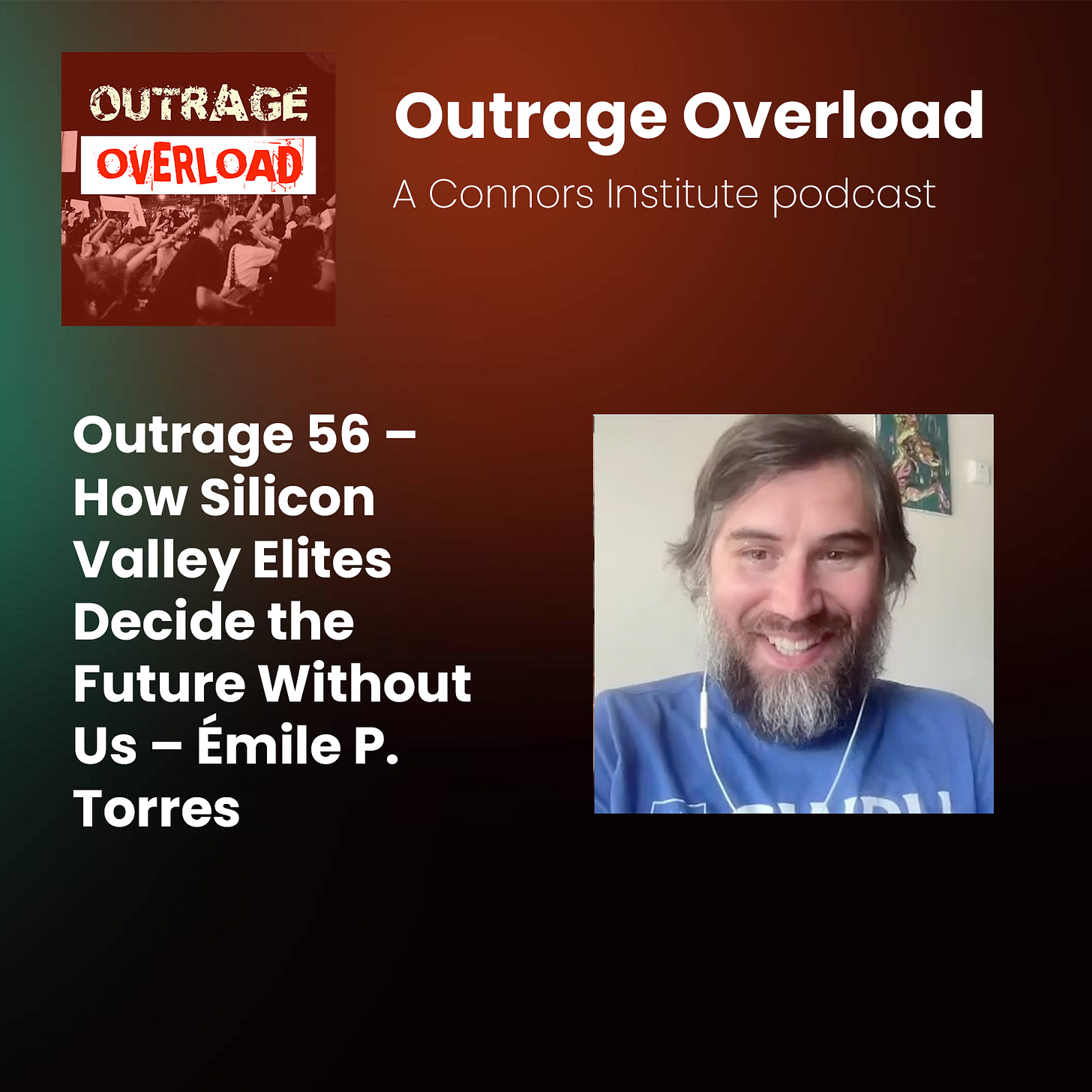The Hubris of Silicon Valley: Reinventing the Wheel with Techno-Utopian Naivety
New Outrage Overload and This Week in Outrage episodes, PLUS a sneak peak to an interview with candidate for DNC Chair, Jason Paul
In our latest episode of Outrage Overload, we sit down with philosopher and technology critic Dr. Émile P. Torres to explore the unchecked hubris of Silicon Valley. Together, we unpack the anti-democratic nature of tech innovation, the environmental and ethical costs of artificial intelligence, and the dangerous allure of techno-utopian dreams. With Elon Musk now stepping into government, this conversation feels more urgent than ever. Dr. Torres challenges the narrow, profit-driven visions of tech elites and asks: Who truly pays the price for their experiments? Don’t miss this thought-provoking discussion on the past, present, and future of technology’s role in society.
For decades, Silicon Valley has been celebrated as the beating heart of innovation, a place where bold ideas and unbridled ambition promise to reshape the world. Yet, beneath this glossy narrative lies a deeper, troubling reality—a culture of hubris and naivety among tech elites who believe they’re the first to tackle humanity’s grandest challenges. Their mantra? That they are smarter, more capable, and uniquely positioned to design the future.
A Historical Blind Spot
One of the most striking features of Silicon Valley’s mindset is its apparent belief that history began in the late 20th century, coinciding with the birth of the personal computer and the internet. In their quest to “reinvent everything,” tech leaders often overlook the lessons of the past. The dream of artificial intelligence, for instance, isn’t new—it dates back to mid-20th-century experiments in machine learning and even earlier philosophical musings on the nature of thought and intelligence. Yet, today’s tech giants trumpet their breakthroughs as if no one before them ever considered such possibilities.
Take the concept of utopian visions fueled by technology. Silicon Valley’s dreams of uploading human minds to the cloud or colonizing space echo ideas that philosophers and science fiction writers have explored for centuries. But unlike those who approached these visions with caution and nuance, many in the Valley frame their pursuits as inevitable and entirely beneficial—ignoring the ethical, social, and environmental complexities that thinkers before them painstakingly considered.
Intelligence vs. Wisdom
Central to this hubris is the belief that intelligence—as measured by technical prowess, coding skills, or even IQ scores—is the ultimate currency. This metric-driven worldview reduces humanity to data points and hierarchies, where those with higher scores are deemed more valuable. But intelligence without wisdom is dangerous. It’s what allows tech leaders to unleash transformative technologies like AI and social media platforms with little regard for their broader societal impacts.
For example, the creators of social media platforms like Facebook and Twitter initially celebrated their potential to connect the world. They failed to anticipate how these same platforms could amplify disinformation, erode mental health, and polarize societies. Even when these consequences became evident, the responses were reactive and insufficient, revealing a deep naivety about the unintended effects of innovation.
Reinventing the Wheel
There’s also a tendency in Silicon Valley to dismiss or disregard existing solutions, believing that their technological acumen can solve problems better than anyone else. Consider how some tech startups approach issues like education or urban planning. Rather than building on decades of research and best practices, they “reimagine” these fields from scratch—often with disastrous results. Projects like WeWork’s failed attempt to revolutionize office culture or Theranos’s implosion in the healthcare space are stark reminders that big ideas need more than just hubris to succeed.
Arrogance with Consequences
The hubris of Silicon Valley isn’t just frustrating—it’s dangerous. When tech leaders believe they are uniquely qualified to decide humanity’s future, they impose their narrow, often privileged worldviews on everyone else. Their visions, shaped by a culture steeped in techno-utopian ideals and profit motives, frequently exclude diverse voices and fail to address real-world complexities.
For instance, the push for autonomous vehicles and AI-driven systems often disregards how these technologies will affect low-income workers or marginalized communities. Similarly, the race to develop AGI (artificial general intelligence) prioritizes the ambitions of a few over the potential risks to billions. Even the environmental toll of massive data centers and cryptocurrency mining—driven by the same technocratic mentality—is too often downplayed or ignored.
Learning from the Past
If Silicon Valley wants to genuinely improve the world, it must first reckon with its own limitations. This means embracing humility and learning from history rather than pretending to exist outside of it. The technologists of today could benefit greatly from engaging with philosophers, sociologists, and historians who have long grappled with questions of progress, ethics, and the human condition.
Moreover, they must adopt a broader, more inclusive approach to innovation—one that values collaboration with experts outside their bubble and prioritizes the needs of all people, not just the privileged few who design and consume their products.
The Need for Wisdom
Innovation requires more than intelligence; it demands wisdom, empathy, and a willingness to listen to diverse perspectives. As Silicon Valley continues to shape the future, it must abandon its hubristic belief that it alone holds the answers. Only by acknowledging the lessons of the past and the voices of the many can we hope to build a future that serves humanity as a whole—not just the whims of a powerful few.
New This Week in Outrage Episode!
It’s everything the Outrage Overload podcast is not. It’s not edited. It’s not scripted. It’s lightly researched. It’s David and Lisa talking about this week in outrage, what was in the news, in the memes, and maybe finding some backstory with a humorous (at least to us) twist.
Houston, We Have a Rat Problem - 1/19/2025
This week, Lisa and David talk about Diet Coke and Inauguration Day cringe; TikTok ban and national security threats; MSNBC Rachel Maddow coming back to daily and president stepping down; UnitedHealth’s stock down nearly 20% since UnitedHealthcare's CEO was killed; military vax discharges; Aaron Rodgers documentary and ayahuasca retreats; drug-eating ra…
🎉 Exciting Announcement! 🎉
We’re thrilled to share that Jason Paul, attorney, political strategist, and candidate for chair of the Democratic National Committee, joined us for an incredible conversation on the Outrage Overload Podcast! 🎙️ Jason shared his unique insights on the media’s role, the challenges of modern politics, and his bold vision for transformative change within the Democratic Party.
Want to hear it before anyone else? The full unedited interview is available now on our YouTube channel for early access! 📺 Watch below:
Stay tuned for the edited version, which will drop on the podcast feed soon. This is a conversation you don’t want to miss!





